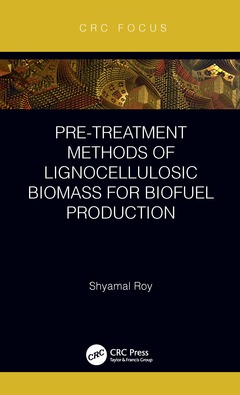Pre-treatment Methods of Lignocellulosic Biomass for Biofuel Production
Auteur : Roy Shyamal

Bioconversion of lignocellulosic biomass to biofuel is materially obstructed by the compositional and chemical complexity of biomaterials, resulting in a challenge in using these as raw materials for the biofuel production process. This book explains various lignocellulosic biomass pre-treatment methods with emphasis on concepts, practicability, mechanisms of action, and advantages and disadvantages and potential for industrial applications. It also highlights the main challenges and suggests possible ways to make these pre-treatment technologies feasible for the biofuel industry.
Features
- Presents different pre-treatment technologies available for lignocellulosic biomass in a concise manner.
- Covers use of different pre-treatment methods in laboratory to industrial scales.
- Includes combined pre-treatment and deep eutectic solvents methods.
- Discusses problems related to industrial adaptation and corresponding economics of different techniques.
- Explores significant fuels and chemicals derived from lignocellulosic biomass.
This book is aimed at graduate students and researchers working on biomass conversion, characterization, cellulose, hemicellulose, lignin, microbial enzymes, fermentation technology, and industrial biotechnology.
Dr. Shyamal Roy completed BE & ME in Chemical Engineering from Jadavpur University, Kolkata, India and Ph.D in Chemical Engineering from Indian Institute of Technology Delhi, New Delhi, India. He completed postdoctoral research from Washington University in St. Louis, MO, USA and Rutgers University, NJ, USA. He also worked as a postdoctoral fellow in Research & Development Centre, Bharat Petroleum Corporation Ltd. He was awarded prestigious Raman Fellowship by UGC, Govt. of India in the year of 2015. Now he is a faculty member at Jadavpur University, Kolkata, India.
Date de parution : 09-2023
13.8x21.6 cm
Date de parution : 09-2021
13.8x21.6 cm
Thèmes de Pre-treatment Methods of Lignocellulosic Biomass for... :
Mots-clés :
Microbial/Enzymatic treatments; Bioconversion; Valorization; Carbon Emissions; Bioreactors; Energy Security; Untreated Rice Straw; Lignocellulosic Biomass; Ethanol Fermentation; Enzymatic Saccharification; Moisture Content; Pretreatment Duration; CS; Switch Grass; Higher Sugar Yield; Electron Beam Irradiation; Lignocellulosic Biomass Materials; Highest Glucose Yield; PEF Pretreatment; Sugar Yield; ILs; Biological Pretreatment; Steam Explosion Pretreatment; Lignin Degrading Enzymes; White Rot Fungi; Steam Explosion; CFP; Short Grinding Time; Pretreated Rice Straw; Hydrodynamic Cavitation; Supercritical



